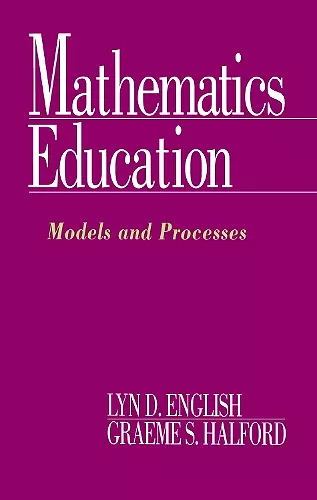Mathematics Education
Models and Processes
Graeme S Halford author Lyn D English author
Format:Hardback
Publisher:Taylor & Francis Inc
Published:1st Jul '95
Currently unavailable, our supplier has not provided us a restock date
This hardback is available in another edition too:
- Paperback£49.99(9780805814583)

To define better techniques of mathematics education, this book combines a knowledge of cognitive science with mathematics curriculum theory and research. The concept of the human reasoning process has been changed fundamentally by cognitive science in the last two decades. The role of memory retrieval, domain-specific and domain-general skills, analogy, and mental models is better understood now than previously. The authors believe that cognitive science provides the most accurate account thus far of the actual processes that people use in mathematics and offers the best potential for genuine increases in efficiency. As such, they suggest that a cognitive science approach enables constructivist ideas to be analyzed and further developed in the search for greater understanding of children's mathematical learning.
Not simply an application of cognitive science, however, this book provides a new perspective on mathematics education by examining the nature of mathematical concepts and processes, how and why they are taught, why certain approaches appear more effective than others, and how children might be assisted to become more mathematically powerful. The authors use recent theories of analogy and knowledge representation -- combined with research on teaching practice -- to find ways of helping children form links and correspondences between different concepts, so as to overcome problems associated with fragmented knowledge. In so doing, they have capitalized on new insights into the values and limitations of using concrete teaching aids which can be analyzed in terms of analogy theory.
In addition to addressing the role of understanding, the authors have analyzed skill acquisition models in terms of their implications for the development of mathematical competence. They place strong emphasis on the development of students' mathematical reasoning and problem solving skills to promote flexible use of knowledge. The book further demonstrates how children have a number of general problem solving skills at their disposal which they can apply independently to the solution of novel problems, resulting in the enhancement of their mathematical knowledge.
"Traces history of the psychology of mathematics education, and summarizes principles of cognition and cognitive development....Valuable reference for mathematics educators and graduate students."
—The American Mathematical Monthly
"...This is a valuable book in what it offers and deserves a place in the library of psychology, mathematics and education departments."
—British Journal of Educational Psychology
ISBN: 9780805814576
Dimensions: unknown
Weight: 860g
372 pages